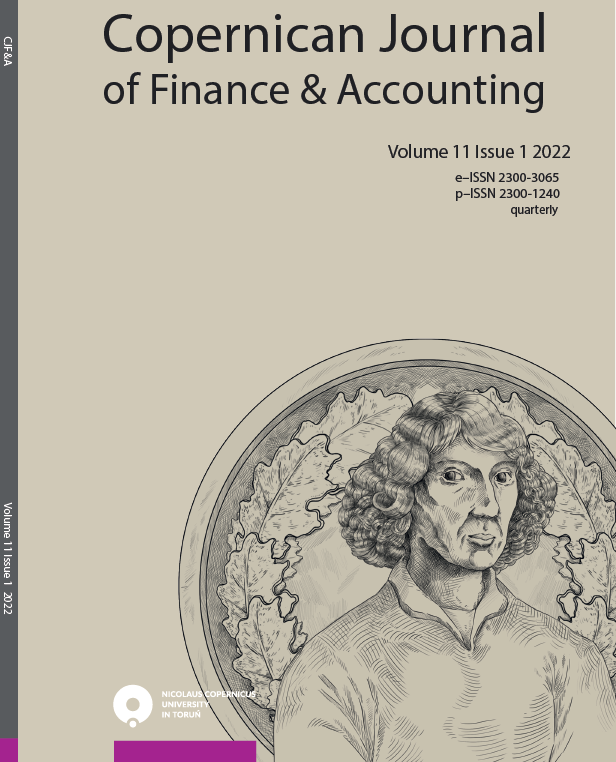CREATIVE ACCOUNTING AND SHAREHOLDERS WEALTH MAXIMIZATION IN LISTED CONSUMER GOODS COMPANIES IN NIGERIA
DOI:
https://doi.org/10.12775/CJFA.2022.003Keywords
creative accounting, shareholders’ wealth, Nigerian Stock ExchangeAbstract
This study examines the effect of creative accounting practices on the shareholders wealth of 90 firm-year observations of ten (10) consumer goods companies listed on the Nigerian Stock Exchange (NSE). Ex post facto research design was adopted using
dataset for the period 2011–2019 which were collated from the annual reports and financial statements of the listed consumer goods companies. Four hypotheses were proposed and tested using pooled panel data regression. Findings revealed that frequent
changes in inventory valuation method and assets valuation methods respectively have significant effect on shareholders wealth, while frequent changes in depreciation methods and liabilities valuation methods do not significantly affect shareholders’ wealth. The study recommends that external auditors should pay attention to discretionary items in the financial statements in order to ensure that the assumptions used by managers are fair. Regulators should also evaluate the adequacy of policies around inventory and assets valuation while financial analysts and shareholders should note the application and consistency of accounting policies on inventory and assets.
References
Adaramola, A., & Atanda, O. (2014). The Relationship between Financial Accounting, Auditing and Market Values of Quoted Firms in Nigeria. Global Journal of Contemporary Research in Accounting, Auditing and Business Ethics, 1(1), 22–39.
Ajibolade, S. (2008). A survey of the perception of ethical behaviour of future Nigerian accounting professionals. Nigerian Accountants, 41(3), 54–59.
Akpanuko, E., & Umoren, N. (2018). The influence of creative accounting on the credibility of accounting reports. Journal of Financial Reporting and Accounting, 16(2), 292–310. http://dx.doi.org/10.1108/JFRA-08-2016-0064.
Bakre, O. (2007). The unethical practices of Accountants and Auditors and the compromising stance of professional bodies in the corporate world: Evidence from corporate Nigeria. Accounting Forum, 31(3), 277–303. http://dx.doi.org/10.1016/j.accfor.2007.06.001.
Balaciu, V., & Vladu, A. (2009). A Brief Review of Creative Accounting Literature and its Consequences in Practice. Annales Universitatis Apulensis Series Oeconomica, 11(1), 170–182.
Bankole, K.O., Ukolobi, I.O., & McDubus, O.F. (2018). Creative accounting practices and shareholders’ wealth. Accounting and Taxation Review, 2(4), 58–74.
Bhasin, M. (2015). Creative Accounting Practices in the Indian Corporate Sector: An Empirical Study. International Journal of Management Sciences and Business Research, 4(10), 35–52.
Bhasin, M. (2016). Survey of Creative Accounting Practices: An Exploratory Study of an Asian Market. International Journal of Management and Social Sciences Research, 5(9), 29–41.
Branka, R., Ivana, K., & Ivo, M. (2018). Creative Accounting-Motives, Techniques and Possibilities of Prevention. Ekonomski Vjesnik, 31(1), 193–199.
Davidson, J. (2002). Communication and Anitithesis in corporate annual reports: A research note. Economics and Finance Discussion Papers Brunel University, 02-13.
Effiok, S., & Eton, O. (2012). Creative Accounting and Mangerial Decision on Selected Financial Institutions in Nigeria. International Journal of Business Research and Management, 3(1), 35–47.
Fagbemi, T.O., Abogun, S., & Salam, M. (2013). The influence of corporate governance on creative accounting practices in Nigeria. Advances in Management (A journal of the Department of Business Administartion, University of Ilorin), 11(1), 1–20.
Fizza, T., & Malik, Q.A. (2015). Creative Accounting and Financial Reporting: Model Development and Empirical Testing. International Journal of Economics and Financial Issues, 5(2), 544–551.
IASB (2018). International Accounting Standards, IASB, London.
Kamau, A. (2015). Creative Accounting among corporations Listed in Nairobi Stock Exchange: Sector Analysis. The International Journal of Business and Management, 4(1),161–168.
Kamau, A., Mutiso, N., & Ngui, M. (2012). Tax Avoidance and Evasion as a factor influencing creative accounting practices among companies in Kenya. Journal of Business Studies, 4(2), 77–84.
Leyira, C.M., & Okeoma, E.C. (2014). The impact of creative accounting on organizational effectiveness: A study of Manufacturing firms in Nigeria. British Journal of Economics, Management and Trade, 2107–2122. http://dx.doi.org/10.9734/BJEMT/2014/7736.
Majanga, B. (2015). The Dividend Effect on Stock Price-An Empirical Analysis of Malawi Listed Companies. Accounting and Finance Research, 4(3), 99–105. http://dx.doi.org/10.5430/afr.v4n3p99.
Mpinda, M. (2013). The Impact of Dividend Payments on Shareholders’ Wealth:Evidence from the vector error correction model. International Business and Economics Research,12(11), 1451–1466. http://dx.doi.org/10.19030/iber.v12i11.8182.
Norri, M. (2013). The challenges of accounts controller for creative accounting techniques. The Journal of Administration and Economics, 7(2), 189–202.
Nyabuti, V., Memba, F., & Chege, C. (2016). Influence of Creative Accounting Practices on the Financial Performance of Companies listed on the Nairobi Stock Exchange in Kenya. International Journal of Management, 3(2), 45–59.
Odia, J., & Ogiedu, K. (2013). Corporate Governance, Regulatory Agency and Creative Accounting Practices in Nigeria. Mediterranean Journal of Social Sciences, 4(3), 55–66. http://dx.doi.org/10.5901/mjss.2013.v4n3p55.
Osahon, O. (2012). Creative Accounting and Firm’s Market Value in Nigeria. Kuwait Chapter of Arabian Journal of Business and Management Review, 2(3), 38–50.
Ozkaya, A. (2014). Creative accounting practices and measurement methods:Evidence from Turkey. Economics e-Journal, 8(29), 1–27. http://dx.doi.org/10.5018/economics-ejournal.ja.2014-29.
Salome, E., Ifeanyi, O., & Marcel, E. (2012). The Effect of Creative Accounting on the Job Performance of Accountants in reporting financial statements in Nigeria. Kuwait Chapter of Arabian Journal of Business and Management Review, 1(9), 1–30.
Shah, S., Butt, S., & Tariq, Y. (2011). Use or abuse of creative accounting techniques. International Journal of Trade, Economics and Finance, 2(6), 531–536.
Škoda, M., Lengyelfalusy, T., & Gabrhelová, G. (2017). Creative accounting practicies in Slovakia after passing financial crisis. Copernican Journal of Finance & Accounting, 6(2), 71–86. http:// dx.doi.org/10.12775/CJFA.2017.012.
Tassadaq, F., & Malik, Q. (2015). Creative accounting and financial reporting: model development and empirical testing. International Journal of Economics and Financial Issues, 5(2), 544–551.
Ubogu, F. (2019). Effect of Creative Accounting on Shareholders’ Wealth in Business Organizations (A study of selected banks in Delta State). International Journal of Social Sciences and Humanities Review, 9(1), 19–38.
Vladu, A., & Matis, D. (2010). Corporate Governance and Creative Accounting: two concepts strongly connected? Some interesting insights highlighted by constructing the internal history of a literature. Annales Universitatis Apulensis Series Oeconomica,1(12), 1–33.
Downloads
Published
How to Cite
Issue
Section
License

This work is licensed under a Creative Commons Attribution-NoDerivatives 4.0 International License.
Stats
Number of views and downloads: 2311
Number of citations: 0



